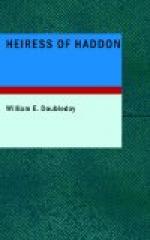It was a scene such as this that the two men gazed upon.
A slight wooden shed afforded protection to the actors from the burning rays of the sun or the more uncomfortable showers of rain. The stage, which was a movable wooden platform, was supported at a little distance from the ground by a number of empty boxes—which a torn piece of faded tapestry vainly endeavoured to hide from view. A small gallery ran along the wall at the rear of the stage, which was ready to do duty as the wall of a castle, a fort, a mountain, an upper room, or a window, or anything else, just as the necessity might be; while a flag, which floated in the breeze from the summit of a stunted pole, announced to the general public that the play was about to commence.
Edmund Wynne had never witnessed such an elaborate display before, and for a time he watched in silent wonder as the people congregated below.
“There will be a goodly company to-day, my lord,” exclaimed the ostler, as he drew his head in after a prolonged look round the yard. “’Twill be a notable day, will this.”
“I tell you I am not a lord,” angrily interrupted Edmund Wynne. “I only wish I were.”
“So do I, James, with all my heart, but look here; here is a proper lord for you, a great lord, too. See, do you know him?”
“No, where?” he quickly replied.
“Do you see that little platform there?”
“With a lamp hanging from the roof?”
“No, that’s the moon for the players. They will light it soon, and we shall know that it is night then, and folks can’t see each other without the moon. Look there;” and he pointed to where two or three gaily-bedecked ladies and some equally gaily-attired gallants were conversing together in a part of the courtyard which was separated from the rest by a rope which stretched from end to end.
“Well, I see them,” he said. “Who might they be, prithee?”
“They might be Pope Joan and the cardinals, but they are not.”
“Then who are they?”
“That thin man, with the big buckles on his shoes, is Sir Henry Sidney.”
“Never!” ejaculated Edmund, “he is too gray haired.”
“Even so, James. He is the Lord Lieutenant of Ireland, and that light-haired boy beside him is little Philip. He is the pet of the Court already, but heigho! whom have we here? Why, it is, yes—it is the Lord High Treasurer himself!”
“So it is,” murmured Edmund, as he carefully retreated well into the shade. “This door won’t attract attention, eh?”
“No, thank goodness, for I can’t very well get out now. You see, ’tis only a loft door, and it is as often open as shut. They will think I have been pitching some hay in.”




